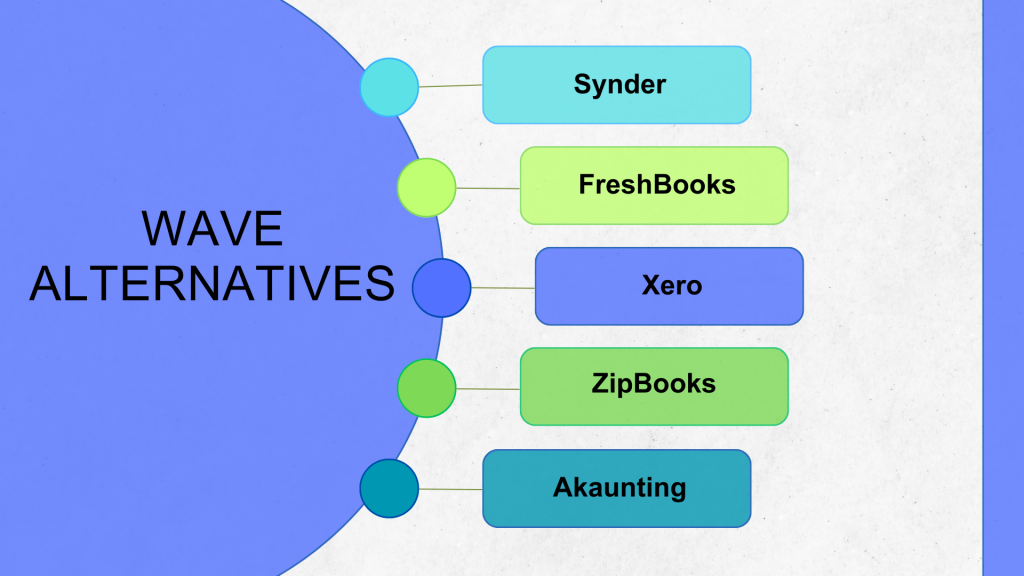Today, you can’t imagine efficient accounting management without using accounting software. Wave rocks the boat for many businesses and entrepreneurs with its user-friendly interface and affordability. However, as one size doesn’t fit all, it might not be the perfect match for everyone.
Still, there’s a sea of alternative options out there. Whether you prefer to ride the Wave or dare to explore new shores with other top-notch solutions, dive in to discover the best accounting fit for your business and ride the accounting tide with more confidence.
What is Wave?
Riding the crest of the financial technology wave, Wave Accounting made quite the splash when it burst onto the scene as a free accounting software solution for small businesses. With its launch in 2010, this cloud-based platform has been making waves among entrepreneurs and freelancers. Packed with services ranging from invoicing and time tracking to accounting management and credit card processing, Wave has become a go-to for those seeking easy-to-use, feature-rich, and cost-effective accounting software.
As we explore the world of Wave alternatives, let’s dive into what makes this software stand out in the sea of accounting competitors.
How does it stand out from its accounting competitors?
As we mentioned above, Wave truly rides a wave of its own as a powerful and user-friendly tool helping businesses manage their finances. Let’s dive into the reasons behind Wave’s success.
Wave pros: #1 – Pricing
First and foremost, Wave’s remarkable pricing model encourages many businesses to give it an immediate try. Unlike many other accounting software options that come with a hefty price tag, Wave offers its core accounting management features entirely for free, being a game-changer for small businesses and startups on a tight budget.
Wave pros: #2 – Impressive feature set at no cost
But don’t be fooled by its price tag; Wave doesn’t skimp on features. The software provides a suite of essential tools, including invoicing, that enables businesses to keep their financials in shipshape condition without spending a single doubloon. With Wave, you can create professional invoices and easily track payments, ensuring a steady cash flow for your business.
Wave pros: #3 – Payment processing
Moreover, Wave doesn’t leave you high and dry when you need to accept payments. It offers credit card processing right within the platform, streamlining the payment process for your customers and saving you the trouble of integrating third-party services. This all-in-one solution is a real asset, giving Wave a leg up over other accounting software that might require additional payment gateways or complicated setups.
Wave pros: #4 – Add-ons a la carte
Wave also sets sail with an impressive suite of add-on services, such as payroll and personal finance management. These services are optional and, while not entirely free (let’s have Wave make some money), are offered at competitive prices, making them an attractive choice for businesses looking to expand their accounting capabilities.
Wave pros: #5 – Ease of use
Another feature that makes Wave stand out is its user-friendly interface and seamless integration with other popular business tools. It allows you to connect your bank accounts and credit cards, automatically categorizing transactions and saving you hours of manual data entry.
No surprise that Wave has maintained an impressive average rating in accounting software directories and garnered praise for its customer support and intuitive navigation.
Why would a business need a Wave alternative?
While the array of enticing features and a free plan may sound appealing, there are limitations to Wave Accounting that may prompt entrepreneurs to explore alternatives among its competitors. Let’s take a closer look at why Wave Accounting may not be a fit for everyone.
Shall we?
Wave cons: #1 – Basic accounting
One of the most notable drawbacks of Wave is its lack of advanced accounting capabilities, which could pose challenges for growing businesses with complex financial needs. While the platform offers basic bookkeeping functionalities, it may struggle to handle intricate accounting processes that demand more sophisticated tracking and reporting.
Wave cons: #2 – Limited support
Additionally, while the free plan is undoubtedly attractive, it comes with certain limitations, such as limited access to customer support and consulting services, making it a valid reason for businesses seeking personalized assistance in their financial journey to look for an alternative to Wave.
Wave cons: #3 – No time-tracking
Another aspect worth considering is the absence of time-tracking features within Wave’s accounting software. Businesses that bill clients based on hourly work or require robust time management integration might regard it as a significant shortcoming. Still, it’s worth mentioning that Wave can integrate with third-party time-tracking tools, but it might require additional effort and expenses.
Wave cons: #4 – Poor customization
Moreover, while Wave features invoicing, it might lack some customization options and templates found in its competitors’ offerings. It can be a deal-breaker for businesses aiming to create professional, branded invoices that make a lasting impression on clients.
Wave cons: #5 – Limited scalability
Pricing flexibility is another factor that may lead businesses to explore alternatives. Wave’s competitive advantage lies in its free version, but as businesses grow and their needs evolve, they may require additional features or more robust capabilities that come at a cost. When comparing Wave with other accounting software, users may find varying pricing models and packages that better align with their needs.
Wave cons: #6 – Lack of integrability
Although Wave has made progress in simplifying procedures, it may not seamlessly integrate with all third-party applications and services that many businesses depend on for daily operations. This lack of integration could impede productivity and require extra solutions, prompting users to explore other alternatives that provide more inclusive and interconnected ecosystems.
Despite these limitations, it’s worth admitting that Wave Accounting is a solid choice for startups, freelancers, and small companies looking for basic accounting solutions at no cost. However, for businesses with more extensive financial requirements, the allure of Wave alternatives lies in their ability to address their specific pain points, offering advanced features, better pricing models, and enhanced user experiences to cater to a broader range of needs.
Five Wave alternatives businesses might want to look at
So, if you see that Wave is not a perfect solution for your business, or you grew out of it and now need more sophisticated software, or whatever is your reason to look for an alternative to Wave, you might want to look at the solutions below. Hopefully, you’ll find something worth trying out.
Let’s dive in.

Synder – smart ecommerce accounting software
Synder is accounting software tailored for online businesses. It seamlessly integrates with over 25+ ecommerce, accounting, and payment platforms, such as Amazon, Shopify, WooCommerce, Stripe, PayPal, QBO, Xero, and more. Acting as a dynamic middleman between a business’s accounting, sales, and payment sources or as a standalone accounting, Synder creates a unified business management ecosystem. It offers real-time synchronization of transactions, ensuring businesses can accurately track sales, refunds, and fees. It handles multiple currencies, making it an ideal choice for businesses with international clients. Moreover, Synder simplifies tax calculations through automation, saving time and reducing the risk of errors, making it particularly helpful to companies that operate in regions with complex tax regulations.
One of Synder’s remarkable strengths is its comprehensive real-time ecommerce analytics called Business Insights. It empowers businesses to track their performance across various sales channels and overall business performance, providing valuable insights to drive strategic decision-making.
The flexibility of Synder’s pricing plans allow businesses to smoothly scale their accounting management as their operations grow and evolve. Add here the top-notch customer support and you get an idea why Synder looks a compelling choice for businesses looking to enhance their financial management capabilities.
Want to know if Synder can be the right fit for your business? Book a seat at the free webinar to have your questions answered or sign up for a free trial to explore Synder yourself.
FreshBooks – small business accounting and invoicing
FreshBooks is another popular Wave alternative known for its user-friendly interface and powerful invoicing and expense tracking capabilities. This accounting software caters well to service-based businesses, consultants, and freelancers who need efficient time tracking and invoicing features.
FreshBooks allows businesses to customize their invoices and easily track billable hours, enabling accurate and timely billing to clients. The platform also offers mobile apps for on-the-go access, making it convenient for busy entrepreneurs to manage their finances from anywhere. FreshBooks also integrates with popular payment gateways, ensuring smooth payment processing for both businesses and their clients.
Xero – comprehensive SMB accounting software
Xero is a robust Wave alternative suitable for both small and medium-sized businesses. It offers a comprehensive set of features, including inventory management, purchase orders, and multi-currency support, making it ideal for businesses with complex accounting needs.
One of Xero’s standout features is its extensive integration with third-party applications and software directories. This integration allows businesses to connect Xero with other essential tools, such as CRM systems and project management software, streamlining their overall business operations.
Xero’s dashboard provides a detailed overview of the business’s financial status, facilitating data-driven decision-making. Its scalability makes it a suitable choice for businesses aiming to expand and grow in the future.
ZipBooks – free AI-powered accounting
ZipBooks is a free Wave alternative that offers essential accounting features to small businesses. Its user-friendly interface and automation capabilities make it an attractive option for entrepreneurs seeking simplicity and efficiency in their financial management.
One of ZipBooks’ unique features is its AI-powered accounting analytics, which analyzes financial data to provide valuable insights. This helps businesses gain a deeper understanding of their financial performance and identify potential areas for improvement.
Additionally, ZipBooks includes time tracking and project management features, making it suitable for service-based businesses that bill clients based on hours worked. For those just starting or operating on a tight budget, ZipBooks’ free plan can be a valuable option to kickstart their accounting journey.
Akaunting – open source accounting software
If you’re an all thing open-source supporter, you might want to explore this accounting solution. Akaunting is an open-source Wave alternative that empowers businesses to customize their accounting software according to their specific needs. This flexibility makes it an attractive choice for businesses with unique requirements that might not be fully met by standardized accounting software.
Akaunting offers a modular design, allowing users to add or remove features as needed. This makes it a scalable solution that can grow with a business over time. The platform also supports multiple languages and currencies, making it an excellent option for businesses with international operations or clients.
Moreover, Akaunting’s community actively contributes to its development, providing a wealth of resources and support for users. Businesses that prefer to have control over their accounting software and want to tailor it precisely to their needs will find Akaunting a compelling alternative to consider.
Considering alternatives to Wave: bottom line
While Wave Accounting has its strengths, it may not be suitable for every business due to limitations in advanced accounting capabilities, limited support, the absence of time-tracking features, and poor customization. If your business requires more advanced features and customization, it may be worth exploring the market of accounting software to find a better alternative that meets your unique requirements and enhances your financial management capabilities. Keep in mind that the list of options provided in this article is not exhaustive, and there are plenty of software options available for businesses of any size. When choosing an accounting solution, consider your business needs and requirements as the most important factor.
Learn more about AR automation and Ecommerce Quickbooks integration.







.png)
